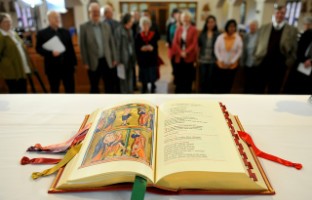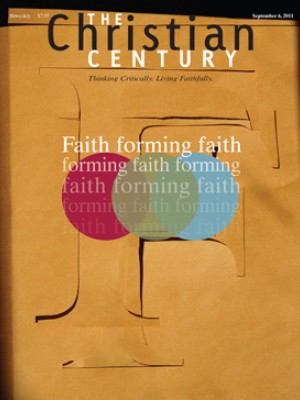Yesterday’s language: The new words of the Catholic mass
Because I affirm the unity of the body of Christ, I consider that the health of one arm affects the entire body. Thus I am either strengthened or weakened by the worship style of other Christians. For decades I've worked as a lay Lutheran toward making the words of Christian worship communally approved, biblically inspired, theologically alive and masterfully crafted. Given these convictions, I say with sadness that the new English translation of the Roman Catholic Order of Mass, mandated by the Vatican to be inaugurated this Advent, wounds not only many of my Catholic friends but also me.
Let me apply these four goals not only to the forthcoming Roman Catholic rite but also to texts used by many Protestant churches.
Words communally approved: Communal approval, as I see it, is achieved by means of a decadelong process involving open questionnaires, diverse committees, scholarly input, theological scrutiny, trial rites, genuine review, prudent revision, a concluding convention vote and denominationally supported education. Yet the new Roman Order of Mass has been smashed down upon the heads of dozens of eminent and skilled wordsmiths who since 1966 have labored to translate the Latin rite into English. The promised communal process was replaced by hierarchical control. Nobody claims that the words of the newly authorized translation are communally approved.
Read our latest issue or browse back issues.
In countless Protestant churches also one finds that the staff or a single minister will compose texts for Sunday. Worshipers are expected to speak with their whole heart words that they have never laid eyes on.
Any new worship text embodies some reform agenda. Was the agenda communally approved? The 2001 Vatican document "Liturgiam Authenticam" describes some of the Roman agenda—and far from being communally affirmed, the Vatican's literalist theory of translation has been criticized by many linguists. Furthermore, much of the Vatican agenda is an unspoken conservative rejection of some recent theological and liturgical developments, a counterreform that recalls the Council of Trent.
And then I wonder: have those ministers who construct their own liturgies clearly articulated their several agendas, and do at least their congregations approve these directions?
How wide is the envisioned Christian community? Much 20th-century liturgical renewal resulted from ecumenical cooperation in which different traditions learned from each other and collaborated on common projects. I am particularly saddened that the new Roman translation reflects a recent Vatican decision to heighten its denominational distinctiveness by rejecting use of ecumenical translations of shared texts such as the Lord's Prayer and the creeds.
Yet all Christians should be concerned when their narrow denominational identity or preferred personal piety outshouts an emerging ecumenical consensus. I think, for example, of those Protestants who, tediously repeating what the 16th-century Reformers said about the medieval Roman canon, refuse to pray a biblically rich Great Thanksgiving at the eucharistic table, even though a century of ecumenical scholarship concurs that eucharistia, the "thanksgiving," is best served by a substantial prayer in which God is praised for the Earth, for centuries of the beloved stories of salvation, for the meal of Christ's body and for the continuous infusion of the Holy Spirit.
Words biblically inspired: That Christians assemble around the word of God as found in a perpetually retranslated Bible raises many issues. Which biblical terminology is necessary for the proclamation of the mystery of Christ? In each language, which words and images best express that biblical vocabulary? How much biblical literacy ought we expect of worshipers? When is a biblical reference inaccessible and thus merely mystifying?
The new Roman translation of the prayer before communion, "Lord, I am not worthy," now adds "that you should enter under my roof." The text assumes that worshipers know the story of the centurion in Luke 7. The intent is noble, the educational task enormous.
In the new Roman rite, the second option for the eucharistic prayer asks the Spirit to be sent down "like the dewfall." In the Hebrew scriptures, I count more than a dozen instances of dew as a metaphor for divine blessings (e.g., Hosea 14:5). Yet I doubt that most of the students I taught at a Catholic university know what "dewfall" is or, since their terrain does not rely on dew for fertility, would find it a powerful image of divine transformation.
And how do all of us cast, for example, the New Testament imagery of becoming slaves of Christ, beyond softening the noun to servants? And have we enriched our liturgy with the countless images for God and the sacraments that we can borrow from the Psalms?
Is the Bible rendered so as to support denominational preferences? Maintaining a traditional translation can inhibit responsibly attending to biblical meaning. That the Catholic Church continues to cast the words of institution in the future tense—"which will be given up for you," "which will be poured out for you"—exemplifies this tendency.
For a Protestant example of this resistance, consider that seminaries have long taught that the Lord's Prayer is a plea for the coming of God's kingdom, and thus the translation "lead us not into temptation" misrepresents the eschatological intention of Matthew's and Luke's reference to the "time of trial" (NRSV), the "final test" (NAB). So why have so few Protestants adopted the more biblically faithful 1988 English Language Liturgical Consultation translation of the Lord's Prayer, which pleads "save us from the time of trial"?
Words theologically alive: In the new Roman text, the theology expressed in the original Latin is the approved belief, and its hierarchical depiction of the church and the Earth is maintained. In a reactionary move, the rubric "the sign of communion is more complete when given under both kinds" is to become "if any are present who are to receive Holy Communion under both kinds. . . ." The response to "the Lord be with you" is now to be rendered "and with your spirit," a change that has been defended as appropriately referring to a higher "spirit" conferred on the clergy at ordination. But is it theologically helpful to be reminded of ecclesiastical status at the time when we greet one another in the Risen Christ?
All of us must inquire which century governs our worship. Have the theological gains of the 20th century entered our Sunday speech? Why do preachers who in a postmodern time accept scholarly proposals about the origin of the New Testament preach as if the Gospels are audiotapes of Jesus' ministry?
Words masterfully crafted: Most worship includes various levels of language: elevated, colloquial and somewhere between. With my national church, I maintain that each of these levels of contemporary speech can be shaped to convey the gospel. But in the new Roman translation, the rhetorical style of complex Latinate sentences suggests that masterful English cannot carry the mystery. Perhaps those who craft liturgical texts are often tempted to resurrect the archaic: I recall that the translators of the King James Version of the Bible decided to continue use of thou-thine-thee, even though it was passing out of colloquial use, because they judged that words which sounded laden with piety would lull users into acceptance.
The new Roman Order of Mass is a compendium of the antiquated. Important nouns (e.g., Priest, Order of Bishops, Martyrs) are capitalized, while unimportant nouns (e.g., deacon, people) are not. Common titles (e.g., opening prayer, censer) are replaced with traditional sacral terms (e.g., collect prayer, thurible). The church is a she. The word soul shows up repeatedly. (I enjoyed asking my students whether they had a soul—most said yes—and if they had one, what it was—big blank.) Does not the choice of archaisms suggest that God is essentially old-fashioned? In the 21st century, what do we mean when we speak about "souls"? The incarnation says to me that our daily speech can carry the presence of God, but perhaps we prefer hiding in our grandmother's attic chest.
For me, the linguistic nadir in the Roman rite is the wording at the cup: Jesus "took this precious chalice in his holy and venerable hands." Of this, I ask, what is the referent? Of precious, I think of Gollum, or worse yet, Precious Moments. Of chalice, I say that although it is a possible translation of the Latin calix, even Indiana Jones could distinguish the cup from a chalice. Of venerable, the dictionary agrees with me that the English word connotes age. I cannot fathom how this phrasing could have been proposed, let alone approved and required.
This lamentable new rite does not represent liturgical language that is communally acceptable, biblically accurate, theologically helpful or linguistically masterful, and it has impelled some Catholic liturgical scholars to conclude that, well, actually, words don't really matter all that much. This strikes me as a counsel of despair, the sad cry of faithful worshipers who feel themselves helpless. I hope that this sense of resignation is not contagious but that all of us, in our varied Christian assemblies, will tirelessly address these issues, toward the continuously renewed vibrancy of our liturgical language.







